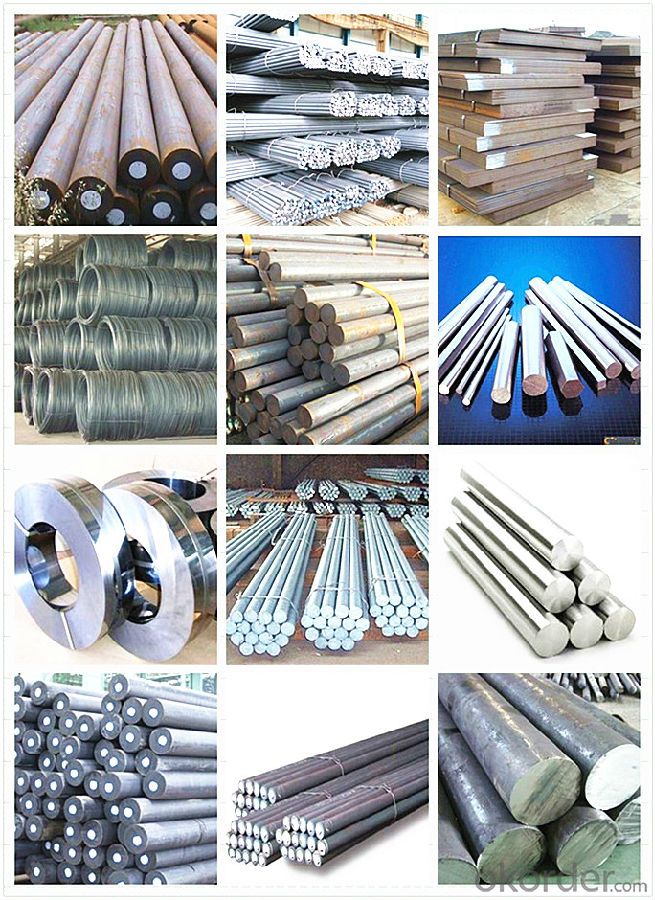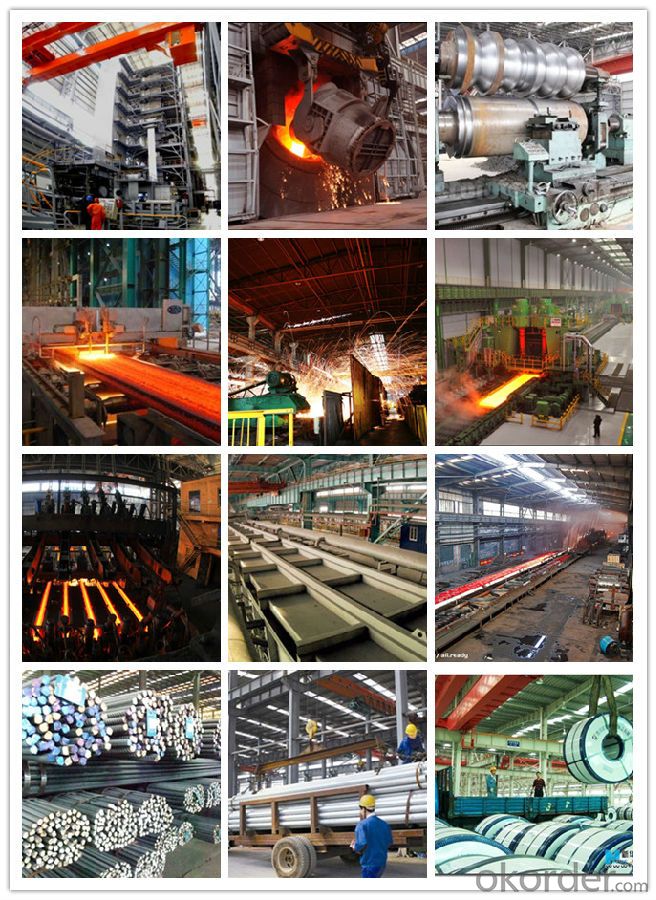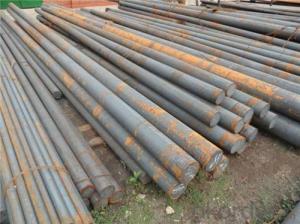Special Steel SCM420H Steel Bar Structural Steel
- Loading Port:
- China main port
- Payment Terms:
- TT OR LC
- Min Order Qty:
- 30 m.t.
- Supply Capability:
- 10000 m.t./month
OKorder Service Pledge
OKorder Financial Service
You Might Also Like
Item specifice
Product Information
1 Standards and Chemical Composition:
GB | DIN | JIS | BS |
20CrMo | 25CrMo4 | SCM420 | 25CrMo4 |
C | Si | Mn | P | S | Cr | Ni | Cu |
0.17-0.23 | 0.15-0.35 | 0.55-0.90 | 0.030 | 0.030 | 0.85-1.25 | 0.30 | 0.30 |
2 Mechanical Property:
Yield Strength (MPa) | ≥685 |
Tensile Strength (MPa) | ≥885 |
Elongation (%) | ≥12 |
Hardness (HB) | ≤197 |
Reduction in Area (%) | ≥50 |
AKV (J) | ≥78 |
3 Brief Introduction:
Dimension | 14-350mm |
Length | 2-13m or as per your request |
Delivery condition | Hot rolled |
Heat Treatment | Normalizing, Annealing, Quenching |
Packing | Standard seaworthy packing or according to your requirements |
Product Show

Workshop Show

Shipping
1. FedEx/DHL/UPS/TNT for samples, Door-to-Door;
2. By Air or by Sea for batch goods, for FCL; Airport/ Port receiving;
3. Customers specifying freight forwarders or negotiable shipping methods!
Delivery Time: 3-7 days for samples; 5-25 days for batch goods.
Payment Terms
1.Payment: T/T, L/C, Western Union, MoneyGram,PayPal; 30% deposits; 70% balance before delivery.
2.MOQ: 1pcs
3.Warranty : 3 years
4.Package Informations: 1) EXPORT, In 20 feet (GW 25 ton) or 40 feet Container (GW 25 ton)
2)as customer's requirement
Why choose us?
(1) The leading exporter in China special steel industry.
(2) Large stocks for various sizes, fast delivery date.
(3) Good business relationship with China famous factories.
(4) More than 7 years steel exporting experience.
(5) Good after-sales service guarantee.
- Q:How does the hardness of special steel affect its machinability?
- The machinability of special steel is significantly influenced by its hardness. Generally, as the hardness of the steel increases, its machinability decreases. Machinability refers to how easily a material can be machined or shaped using various machining processes like cutting, drilling, or milling. Hardness denotes a material's resistance to indentation or scratching. It is typically measured using the Rockwell hardness scale or the Brinell hardness test. Special steel, known for its high strength and durability, usually possesses a higher hardness compared to other steel types. When machining special steel, encountering a harder material presents challenges for multiple reasons. Firstly, cutting harder materials requires greater cutting forces and generates more heat during the machining process, making them more difficult to cut. Consequently, this leads to increased tool wear and reduced tool life, resulting in higher production costs. Secondly, hard steel tends to have lower ductility and toughness, making it more susceptible to cracking or chipping during machining. As a consequence, poor surface finish, dimensional inaccuracies, and even component failure can occur. Furthermore, increased hardness in special steel also impacts chip formation. Harder materials tend to produce shorter and more segmented chips, which can cause problems with chip evacuation and tool clogging. This further hampers the machining process and affects overall productivity. To enhance the machinability of hard special steel, several strategies can be employed. Choosing appropriate cutting tools with specific geometries and coatings designed for hard materials is crucial. Additionally, optimizing cutting parameters such as cutting speed, feed rate, and depth of cut can help mitigate the negative effects of hardness on machinability. In conclusion, the hardness of special steel directly affects its machinability. As hardness increases, machinability decreases due to higher cutting forces, increased tool wear, reduced ductility, and chip formation challenges. However, by employing proper tool selection and optimizing cutting parameters, the machinability of hard special steel can be improved, enabling efficient and cost-effective machining processes.
- Q:What are the different applications of tool special steel?
- Tool special steel is a versatile material with unique properties that finds applications in various industries. Some of the diverse uses of this steel include: 1. Cutting Tools: In the manufacturing of drills, saw blades, milling cutters, and lathe tools, tool special steel is widely employed. Its exceptional hardness, wear resistance, and toughness ensure long tool life and superior cutting performance. 2. Dies and Molds: Tool special steel is extensively used in the production of dies and molds for metalworking and plastic injection molding processes. It is suitable for these demanding applications due to its ability to withstand high temperatures, resist wear and deformation, and maintain dimensional stability. 3. Automotive Industry: Tool special steel is employed in the automotive industry for various components such as crankshafts, gears, camshafts, and engine valves. Its outstanding strength, fatigue resistance, and heat resistance qualities contribute to the overall durability and performance of automotive parts. 4. Aerospace Industry: The aerospace industry utilizes tool special steel for applications such as turbine blades, aircraft engine components, landing gears, and structural parts. Its high strength, corrosion resistance, and ability to withstand extreme temperatures and pressure make it an ideal choice for these critical applications. 5. Construction and Mining: In the construction and mining sectors, tool special steel is used for equipment like excavator buckets, rock drills, bulldozer blades, and drilling bits. Its remarkable hardness, toughness, and resistance to abrasion enable these tools to withstand the harsh conditions encountered in these industries. 6. Tooling Industry: In the tooling industry, tool special steel is extensively employed in the manufacture of various types of tools and equipment. Hand tools, power tools, and precision instruments all benefit from the exceptional strength, hardness, and resistance to wear and deformation of tool special steel. 7. Medical Industry: In the medical field, tool special steel is utilized for the production of surgical instruments, orthopedic implants, and dental tools. Its biocompatibility, corrosion resistance, and ability to be sterilized make it suitable for these critical applications. These examples highlight the numerous applications of tool special steel. Its unique properties make it a valuable material in various industries where durability, strength, and precision are essential requirements.
- Q:What are the different methods of preventing pitting corrosion in special steel?
- There are several methods available to prevent pitting corrosion in special steel. These techniques aim to protect the steel surface from the corrosive environment and inhibit the formation of pits. Some of the commonly used methods include: 1. Passivation: Passivation involves treating the steel surface with a chemical solution or coating to create a protective oxide layer. This layer acts as a barrier, preventing the penetration of corrosive agents and reducing the risk of pitting corrosion. 2. Alloying: By adding specific alloying elements to the steel composition, its resistance to corrosion can be improved. Elements such as chromium, nickel, and molybdenum are often used as they enhance the steel's ability to form a stable passive film and resist pitting corrosion. 3. Cathodic protection: This method involves using a sacrificial anode or applying an impressed current to the steel surface. By making the steel cathodic, it becomes less susceptible to corrosion as electrons are drawn away from it, preventing the formation of pits. 4. Coatings: Applying a protective coating to the steel surface can effectively prevent pitting corrosion. Coatings such as paint, epoxy, or polymer-based materials act as a physical barrier, shielding the steel from corrosive agents. 5. Environmental control: Controlling the environment surrounding the steel can also help prevent pitting corrosion. This includes measures such as regulating temperature, humidity, and pH levels to ensure they are within acceptable limits and inhibiting the corrosion process. 6. Regular maintenance: Regular inspection and maintenance of the steel surface are crucial for preventing pitting corrosion. Any signs of damage or deterioration should be addressed promptly to prevent further corrosion and potential pitting. It is important to note that the choice of prevention method depends on various factors such as the specific steel composition, the corrosive environment, and the intended application. Proper selection and implementation of these methods can significantly enhance the resistance of special steel to pitting corrosion, ensuring its longevity and performance.
- Q:What are the different methods of improving the wear resistance of special steel?
- There are several methods that can be employed to improve the wear resistance of special steel. Firstly, heat treatment techniques such as quenching and tempering can be used. Quenching involves rapidly cooling the steel in a liquid medium, such as oil or water, to increase its hardness. This process forms a hardened surface layer that can resist wear. Tempering, on the other hand, involves reheating the quenched steel to a specific temperature and then cooling it slowly. This helps to reduce the brittleness caused by quenching and improve the steel's toughness, which is important for wear resistance. Another method is through alloying. Adding elements such as chromium, manganese, or vanadium to the steel can significantly enhance its wear resistance. These alloying elements form carbides, nitrides, or borides, which increase the hardness and improve the material's ability to resist wear and abrasion. Surface treatment techniques like carburizing or nitriding can also be employed. Carburizing involves introducing carbon into the steel's surface by heating it in a carbon-rich atmosphere. This forms a hardened surface layer with a high carbon content, making the steel more wear-resistant. Nitriding, on the other hand, involves diffusing nitrogen into the steel's surface, forming nitrides that increase hardness and wear resistance. Furthermore, physical vapor deposition (PVD) or chemical vapor deposition (CVD) coatings can be applied to the steel surface. PVD involves depositing a thin layer of wear-resistant material, such as titanium nitride or diamond-like carbon, onto the steel's surface using a vacuum process. CVD, on the other hand, involves depositing a wear-resistant coating by chemical reactions at elevated temperatures. These coatings provide an additional layer of protection against wear and friction. Lastly, the grain size of the steel can be controlled through processes like grain refinement or severe plastic deformation. Smaller grain sizes typically result in increased hardness and improved wear resistance. Overall, a combination of these methods can be used to enhance the wear resistance of special steel, depending on the specific application and desired properties.
- Q:What are the common applications of special steel in the manufacturing industry?
- Special steel, also known as alloy steel, is widely used in the manufacturing industry due to its unique properties and superior performance in various applications. Some common applications of special steel in the manufacturing industry include: 1. Automotive Industry: Special steel is extensively used in the manufacturing of automobile components such as engine parts, gears, axles, and crankshafts. The high strength, durability, and resistance to wear and corrosion make special steel an ideal choice for these critical automotive applications. 2. Aerospace Industry: Special steel plays a vital role in the aerospace sector, where it is used for manufacturing aircraft components like landing gear, turbine blades, and structural parts. The high tensile strength, lightweight nature, and ability to withstand extreme temperatures make special steel indispensable for ensuring the safety and efficiency of aircraft operations. 3. Construction Industry: Special steel finds widespread use in the construction sector for manufacturing structural elements like beams, columns, and reinforcement bars. The superior strength, ductility, and resistance to external forces make special steel an essential material for ensuring the structural integrity and safety of buildings, bridges, and other infrastructure projects. 4. Oil and Gas Industry: Special steel is extensively utilized in the oil and gas industry for manufacturing pipelines, drill bits, valves, and other equipment. The high resistance to corrosion, pressure, and extreme temperatures make special steel suitable for handling the harsh operating conditions encountered in oil and gas exploration, extraction, and transportation. 5. Tool and Die Making: Special steel is commonly employed in tool and die making due to its excellent hardness, toughness, and wear resistance. It is used for manufacturing cutting tools, molds, dies, and punches required in various industries such as automotive, aerospace, and consumer goods manufacturing. 6. Medical Industry: Special steel finds applications in the manufacturing of surgical instruments, implants, and medical devices. The biocompatibility, corrosion resistance, and sterilizability of special steel make it an ideal material for ensuring the safety and effectiveness of medical tools and implants. These are just a few examples of the common applications of special steel in the manufacturing industry. The versatility, reliability, and performance of special steel make it a preferred material choice in numerous other sectors, contributing to the advancement and growth of various manufacturing processes.
- Q:Can special steel be used in the electronics manufacturing industry?
- Yes, special steel can be used in the electronics manufacturing industry. Special steel alloys, such as stainless steel or high-strength low-alloy (HSLA) steel, offer excellent properties like corrosion resistance, electrical conductivity, and magnetic shielding, making them suitable for various electronic components like connectors, sensors, circuit boards, and casings. These specialized steel materials ensure durability, protection, and reliable performance in demanding electronic applications.
- Q:How does special steel perform in terms of fatigue resistance?
- Special steel performs exceptionally well in terms of fatigue resistance. Its unique composition and heat treatment processes enhance its ability to withstand repeated cyclic loading, preventing the occurrence of fatigue failure. This makes special steel an ideal choice for applications where durability and longevity are crucial, such as in aerospace, automotive, and heavy machinery industries.
- Q:Can special steel be used in renewable energy applications?
- Yes, special steel can be used in renewable energy applications. Special steel alloys such as stainless steel and high-strength low-alloy (HSLA) steel are commonly used in the manufacturing of wind turbines, solar panels, and hydroelectric power systems. These alloys offer excellent corrosion resistance, high strength, and durability, making them ideal for withstanding harsh environmental conditions and ensuring long-term performance in renewable energy applications.
- Q:Can special steel be used for tooling applications?
- Yes, special steel can be used for tooling applications. Special steel alloys possess unique properties such as high strength, wear resistance, toughness, and heat resistance, making them suitable for tool manufacturing in various industries such as automotive, aerospace, and manufacturing. These tooling applications include molds, dies, cutting tools, and precision instruments, where the use of special steel ensures the durability and performance required for demanding operations.
- Q:What are the main properties of special steel?
- Special steel is characterized by a variety of properties that set it apart from regular steel. Some of its key properties include high strength, excellent corrosion resistance, superior heat resistance, exceptional toughness, and good wear resistance. Additionally, special steel can be easily machined, welded, and formed, making it highly versatile for various industrial applications.
1. Manufacturer Overview |
|
|---|---|
| Location | |
| Year Established | |
| Annual Output Value | |
| Main Markets | |
| Company Certifications | |
2. Manufacturer Certificates |
|
|---|---|
| a) Certification Name | |
| Range | |
| Reference | |
| Validity Period | |
3. Manufacturer Capability |
|
|---|---|
| a)Trade Capacity | |
| Nearest Port | |
| Export Percentage | |
| No.of Employees in Trade Department | |
| Language Spoken: | |
| b)Factory Information | |
| Factory Size: | |
| No. of Production Lines | |
| Contract Manufacturing | |
| Product Price Range | |
Send your message to us
Special Steel SCM420H Steel Bar Structural Steel
- Loading Port:
- China main port
- Payment Terms:
- TT OR LC
- Min Order Qty:
- 30 m.t.
- Supply Capability:
- 10000 m.t./month
OKorder Service Pledge
OKorder Financial Service
Similar products
New products
Hot products
Related keywords






























